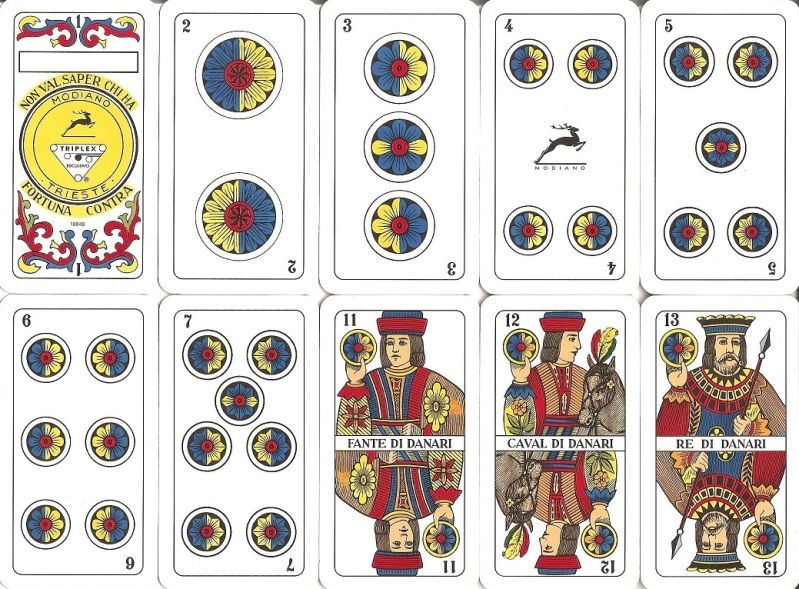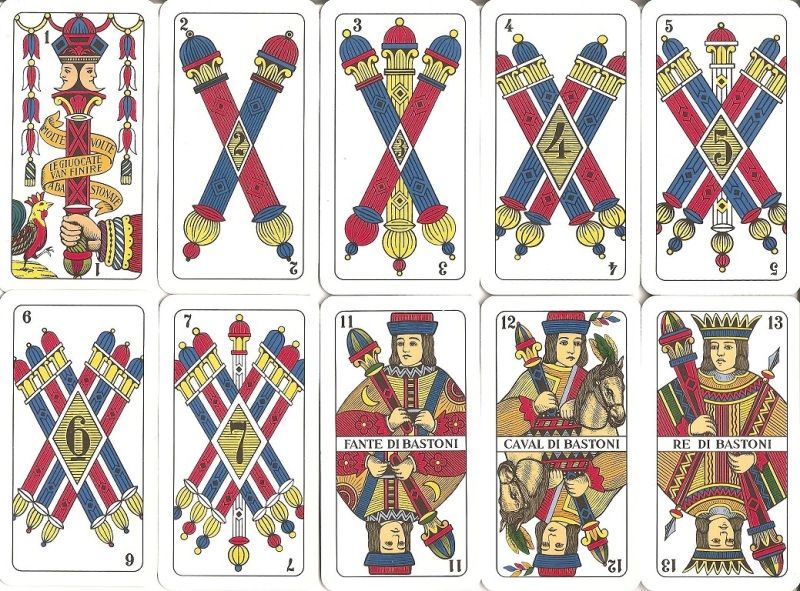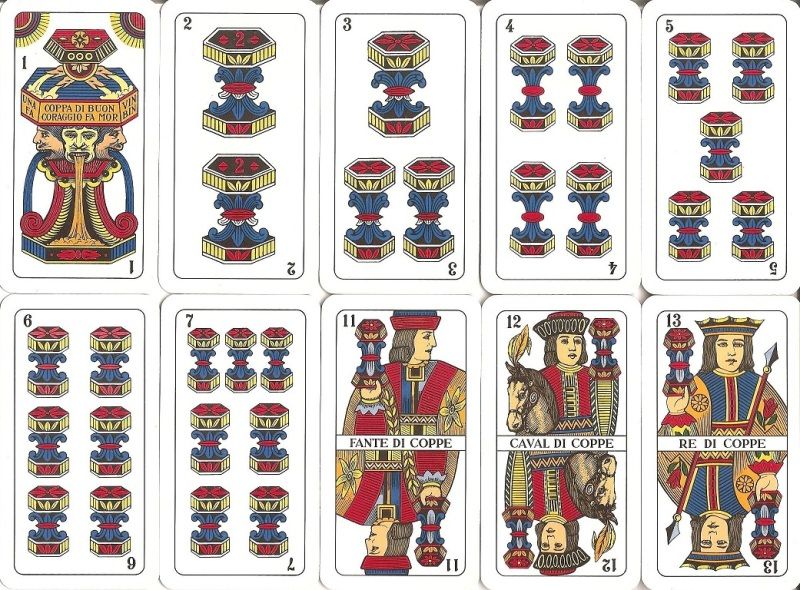Briscola (unknown / 18th Century)
2-6 players / 8 + / 15-60 minutes
Kid #1: "Dad, what are those bolt-looking things again?"
"Um...that would be the 'cups' suit."
Kid #2: "Wait, how do you tell the ace of swords from the ace of batons, again?"
"Like I said, the ace of swords has the two chickens and the ace of batons only one."
Kid #3: "Where's the queen?"
"No, the queen is in the standard cards. These have knights, instead, remember?"
Kid #1: "The queen's a 'he?'"
"No! Well, yeah, from your point of view, sort of..."
Kid #4: "...are the swords curved or straight?"
Sigh. "Most are curved, but some are straight."
Kid #2: "But the batons are straight!"
"Yeah, but they have little knobby ends."
Kid #3: "What's the king and the jack?"
"The kings are wearing the crowns. And numbered 13 in the top corner. Jacks are numbered 11."
Kid #4: "Well, if there aren't any 8, 9, or 10s, then why is the jack 11? Shouldn't it be 8?"
"I don't know know!"
Kid #2: "Do you have any other cards?"
"Hmmm...well, I do have this German-suited pack..."
Kid #1: "Dad, what are those bolt-looking things again?"
"Um...that would be the 'cups' suit."
Kid #2: "Wait, how do you tell the ace of swords from the ace of batons, again?"
"Like I said, the ace of swords has the two chickens and the ace of batons only one."
Kid #3: "Where's the queen?"
"No, the queen is in the standard cards. These have knights, instead, remember?"
Kid #1: "The queen's a 'he?'"
"No! Well, yeah, from your point of view, sort of..."
Kid #4: "...are the swords curved or straight?"
Sigh. "Most are curved, but some are straight."
Kid #2: "But the batons are straight!"
"Yeah, but they have little knobby ends."
Kid #3: "What's the king and the jack?"
"The kings are wearing the crowns. And numbered 13 in the top corner. Jacks are numbered 11."
Kid #4: "Well, if there aren't any 8, 9, or 10s, then why is the jack 11? Shouldn't it be 8?"
"I don't know know!"
Kid #2: "Do you have any other cards?"
"Hmmm...well, I do have this German-suited pack..."
Briscola is a fun and unique point trick taking card game that is extremely popular in Italy and found in many variations throughout Mediterranean Europe. It is not well-known in North America. Using a 40-card pack, it is even more fun and unique when played with one of the traditional, regional Italian card decks. You can also play with a standard, 52-card, French-suited deck by removing all of the Tens, Nines, and Eights. Cards rank A-3-K-Q-J-7-6-5-4-2. In the Italian-suited decks, there are no Queens, but instead a Cavallo (horse/knights) and the Jacks are Fante (or infantrymen). Instead of clubs, spades, hearts, and diamonds, the Italian suits are batons, swords, cups, and coins.
Basic game play is straight-forward. In the 2-, 3-, 4-, and 6-player games, everyone is dealt three cards (in the 3-player version, you must first remove one of the Two's from the deck for a total of 39 cards). The top card of the draw pile is then turned up to determine trumps for that round and placed face up under the draw pile so that the suit is visible. Play then proceeds counter-clockwise; so the player to the dealer's right begins by leading a card of his choice. Subsequent players do not have to follow suit nor are they obligated to play trump, if possible, but instead may play any card. The highest trump card, or if no trump is played then the highest card of the suit led, wins the trick. Beginning with the winner of the trick, each player will now draw a card, bringing their hand back to three cards. The winner of the previous trick leads to the next. When the draw pile is exhausted (the last player to draw will receive the face up trump card at the bottom of the pile), play continues as normal without drawing new cards until all hands have been played. Then each player counts the card points in their captured tricks as follows:
- Ace = 11 points
- Three = 10 points
- Re (King) = 4 points
- Cavallo (Queen) = 3 points
- Fante (Jack) = 2 points
The 5-player version is slightly different. In Briscola Chiamata (or Call Briscola), all players are dealt eight cards, so that there is no draw pile. Then there is one round of bidding, beginning with the player to the dealer's right. In one variation, players first bid the number of points they expect to win. The highest bidder then gets to call one card of a particular suit which determines two things. First, the called suit is trumps for that round. Second, the holder of that card becomes the caller's partner for that round. Play then proceeds as in normal Briscola (sans drawing new cards), with the called partner keeping his identity a secret until he plays the called card. After all eight tricks have been played the caller and his partner must have earned at least the number of points originally bid. The other bidding variation involves players calling for a specific card and suit, with the lowest card winning the bid. That card determines both trumps and partners for the round, with the caller and his partner needing to win at least 61 card points. In both variations, when successfully winning a bid hand, the caller earns 2 game points, his partner earns 1, and the other three lose 1 point each. However, if unsuccessful, the caller loses 2 game points, his partner loses 1, and the other players each earn 1.
 |
| Triestine pattern - Coins |
E for Everyone:
There are a lot of point trick taking card games. Indeed, it is probably the most popular and commonly played genre throughout Europe and the Americas. Briscola is a very nice primer to the family. The freedom to play any card you wish without the requirement to follow suit is off-set by the fact that you only have three cards in your hand at any one time. This creates a manageable situation in which kids can learn how to assess what they're able to win and lose, as well as analyze what they're willing to give away. In all point trick taking games, there is generally a give-and-take whereby sacrificing a higher point card is worth it to save another of even lower value, especially if that lower card is trump. Briscola's three-card hand limit and basic rules set really facilitate learning these strategies.
 |
| Triestine pattern - Batons |
Probably the biggest appeal to Briscola is its scalability. Sure, many card games can be altered to accommodate a number of player variations, but really are only fun when played by a specific number. For example, you can play Cribbage with 3 or 4, but it was created with 2 players in mind. Pitch shines a lot better with 4 or 5, despite rules allowing for 3. Then there are numerous games like Hearts and Spades and Euchre designed for only 4. Briscola really is just as smooth and fun with any number of players (though I have not played the 6-player version). I enjoy the 5-player variant the best, but there is enough difference between them all as to keep things interesting and fresh. And while you may prefer other card games when you have 4 players at hand, this is a superior option for those times when there is the odd number of people; or it is just you and another (and you don't have a cribbage board!).
Initially, the odd card ranking kept tripping up my kids because they forgot that Three's are ranked just below Ace's. Now, it's just automatic for them, though I honestly can't pin down exactly how many plays it took to reach that point. It is also helpful, I think, to introduce and teach the game to kids using the Italian cards as they already have presumptions based on earlier experiences with the A-K-Q-J structure of standard American cards. Of course, there are other games with a similar ranking switch in the Ace-Ten family (e.g., Pinochle), where the Ten replaces the Three. Briscola's ease of play makes it a nice choice to acclimate kids to that mechanic. The other possible wrinkle to this Italian gem, ironically, is the open-ended card play. Most other trick-taking games require players to follow suit and/or play a trump card. With no such restriction here, an over-familiarity has led to some hesitation amongst my kids to try other trick taking games that have such limitations. They are too comfortable with the freedom that Briscola gives.
 |
| Triestine pattern - Swords |
For more authentic flavor, I did purchase some Italian playing cards, having to choose from sixteen different patterns! The Triestine pattern seemed like it would be a little easier for the kids and I to get used to. First of all, it has numbered indices, in case there is confusion over counting the number of swords or batons. Second, the court cards are double-sided like those in a standard deck, whereas most of the other Italian cards have single standing portraits that force you to constantly flip them over so that they're standing upright! And finally, the words "Re," "Caval," and "Fante," are printed in the center of the court cards to help distinguish each from the other. I would not say that the Triestine pattern is the most aesthetically appealing, but it certainly seems the most practical for Americans learning to play with Italian decks.
 |
| Triestine pattern - Cups |
There are several electronic implementations of Briscola. For the iPhone or iPad, I recommend the La Briscola app. Although it is two-player only, it is free and has all of the regional card decks available. Likewise for the BTM Pro+ computer download. Thanos has an excellent four-player version for free download. The Pagat.com entry has a handful of other options for download or online versions of the game.
Okay, I'll Shut-Up Now:
Briscola strikes a wonderful balance between light, breezy social game and tense, strategic battle of wits. This is a good one for children and beginners as it is easy to learn, simple to play, and having just the right card at just the right time serves as an equalizing measure of sorts. However, a player with a keen memory, experience, and savvy partnership chemistry will have the overall advantage. It is a good introduction for kids in the point trick taking genre, while Briscola Chiamata adds a bidding element which is common to many card games, as well. And from an American perspective, the peculiar, Italian-suited cards add a little touch of the exotic to enhance the experience.


No comments:
Post a Comment